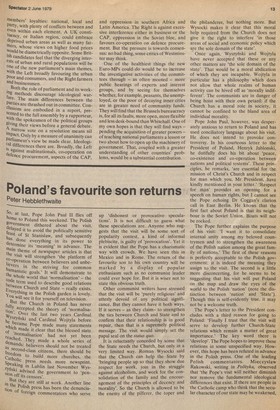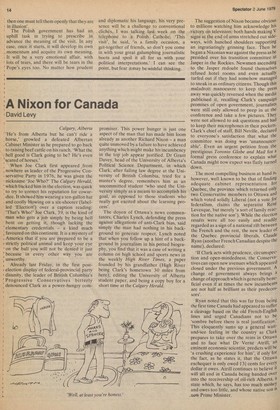Poland's favourite son returns
Peter Hebblethwaite
So, at last, Pope John Paul H flies off home to Poland this weekend. The Polish government dithered about the visit, delayed it to avoid the politically sensitive feast of St Stanislaw, and subsequently has done everything in its power to determine its 'meaning' in advance. The main theme of newspaper articles is that the visit will strengthen 'the platform of c.o.-operation between believers and unbelievers in the striving for common humanistic goals.' It will demonstrate to the whole world that 'normalisation' — the code term used to describe good relations between Church and State — really exists. '.'erything in the Polish garden is lovely. You will see it for yourself on television. But the Church in Poland has never fully accepted the theory of 'normalisation-. Over the last two years Cardinal Wyszyiiski and Cardinal Wojtyla before he .became Pope made many statements Which made it clear that the blessed state of 'normalisation' had not yet been reached. They made a whole series of demands: believers should not be treated as second-class citizens, there should be freedom to build more churches, the Catholic press needs more newsprint. SP!aking in Lublin last November Wys zynski advised the government to 'pension off its censors'. But they in. the Polish press still at work. Another line sh press has been the denuncia tion of foreign commentators who serve up 'dishonest or provocative speculations'. It is not difficult to guess what these speculations are. Anyone who suggests that the visit will be some sort of popularity contest, a kind of informal plebiscite, is guilty of 'provocation'. Yet it is evident that the Pope has a charismatic way with crowds. We have seen this in Mexico and in Rome. The return of the favourite son to his own country will be marked by a display of popular enthusiasm such as no communist leader could ever hope for. But it is wiser not to state this obvious truth.
Other communist writers have stressed that the visit will be 'purely religious' and utterly devoid of any political significance. But they cannot have it both ways. If it serves — as they claim— to strengthen the ties between Church and State and to confirm that their relationship is in good repair, then that is a supremely political message. The visit would simply set the papal seal on the status quo. It is reluctantly conceded by some that the State needs the Church, but only in a very limited way. Roman Wysocki said that the Church can help the State by 'bringing people up so that they show due respect for work, join in the struggle against alcoholism, and work for the consolidation of the family and the encouragement of the principles of decency and morality'. So the Church is allowed to be the enemy of the pilferer, the toper and the philanderer, but nothing more. But Wysocki makes it clear that this moral help required from the Church does not give it the right to interfere 'in those areas of social and economic policy which are the sole domain of the state'.
Once again, Wyszyliski and Wojtyla have never accepted that these or any other matters are 'the sole domain of the state'. That would be a moral abdication of which they are incapable. Wojtyla in particular has a philosophy which does not allow that whole realms of human activity can be hived off as 'morally indifferent'. The communists are in danger of being hoist with their own petard: if the Church has a moral role in society, it cannot be confined to the bland area of individual morality.
Pope John Paul, however, was desperately anxious to return to Poland and has used conciliatory language about his visit. He does not intend to provoke controversy. In his courteous letter to the President of Poland, Henryk Jablonski, he dutifully does his bit about 'peace, co-existence and co-operation between nations and political systems'. These principles, he remarks, 'are essential for the mission of Christ's Church and in respect for man which you, Mr President, have kindly mentioned in your letter.' Respect for man' provides an opening for a speech on human rights, but I cannot see the Pope echoing Dr Coggan's clarion call in East Berlin. He knows that the first fact about Poland is that its neighbour is the Soviet Union. Boats will not be rocked.
The Pope further explains the purpose of his visit: want it to consolidate internal unity among my beloved countrymen and to strengthen the awareness of the Polish nation among the great family of nations.' The first of these reasons is perfectly acceptable to the Polish government: it is indeed the meaning they assign to the visit. The second is a little more disconcerting, for he seems to be suggesting that his visit will put Poland on the map and draw the eyes of the world to the Polish 'nation' (note the distinction between 'nation' and `State'). Though this is self-evidently true, it may not be a welcome truth.
The Pope's letter to the President concludes with a third reason for going to Poland: 'Finally I trust that the visit will serve to develop further Church-State relations which remain a matter of great importance.' The key word there is 'develop'. The Pope hopes to improve these relations in some unspecified way. However, this hope has been refuted in advance in the Polish press. One of the leading Polish commentators. Mieczyslaw Rakowski, writing in Polityka, observed that 'the Pope's visit will neither diminish nor remove the fundamental ideological differences that exist. If there are people in the Catholic camp who think that the secular character of our state may be weakened, then one must tell them openly that theyare in illusion'.
The Polish government has had an uphill task in trying to prescribe in advance the meaning of the visit. In any , case, once it starts, it will develop its own , momentum and acquire its own meaning. . It will be a very emotional affair, with • lots of tears, and there will be tears in the ' Pope's eyes too. No matter how prudent and diplomatic his language, his very presence will be a challenge to conventional clichés. I was talking last week on the telephone to a Polish Catholic. 'This visit', he said, 'is a family occasion, a get-together of friends, so don't you come in with your great galumphing journalistic boots and spoil it all for us with your political interpretations.' I can see the point, but fear it may be wishful thinking.







































 Previous page
Previous page